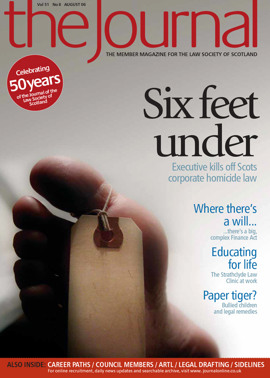Mark the pre-proof

With effect from 18 August 2006, the Ordinary Cause Rules and the rules relating to summary applications etc are amended. This article principally deals with the major significant amendment introducing pre-proof hearings.
For a number of years, although there was no provision in the OCR, pre-proof hearings have been a regular feature in some courts. I understand that both bench and bar consider such hearings to be valuable. The Act of Sederunt (Ordinary Cause and Summary Application Rules) Amendment (Miscellaneous) 2006 introduces a new rule, OCR 28A.1. In terms of that rule a sheriff, on the motion of any party or ex proprio motu, when appointing proof or proof before answer, may assign a pre-proof hearing. Whilst such a hearing does not require to be assigned, I suspect this will become the norm. The rules relating to options hearings and chapter 10 procedural hearings are amended to require a sheriff to consider assigning a pre-proof hearing.
The time limit for lodging productions is lengthened to 28 days prior to the proof. As a result I would imagine the hearing will take place within those 28 days. Clearly the availability of productions may well be beneficial in fulfilling the purposes of the hearing. It is the duty of all parties to provide the sheriff with sufficient information to enable the court to conduct the hearing in accordance with the rule.
Aims of the hearing
The sheriff at the hearing is required to ascertain, insofar as reasonably practicable, whether the proof is likely to proceed on the date assigned. In particular the sheriff shall ascertain the parties’ state of preparation and their compliance with the rules relating to lists of witnesses and documents and their inspection, lodging of productions, and instruction of a shorthand writer. The sheriff shall further ascertain whether any previous order relating to lodging of a joint minute of admissions has been complied with. The sheriff may discharge the diet of proof and assign a fresh diet, adjourn the pre-proof hearing, or make such other order as is considered appropriate to secure the expeditious progress of the cause. A pre-proof hearing is a diet for the purposes of the default provisions.
The sheriff clearly is required to take an interventionist approach and the solicitor appearing will require a full knowledge of the case and his/her client’s position. Whilst the power is to secure the expeditious progress as opposed to expeditious resolution of the cause, it seems fair to assume that in making orders to secure expeditious progress an action may well be pushed towards resolution. If productions are not lodged the sheriff will no doubt enquire why. The appropriate orders can be made. Orders with regard to joint minutes of admissions are likely to be more common, as the pleadings should be finalised, or any amendment process commenced. An example might be agreement as to quantum. Further, with all or most productions lodged, a joint minute could deal with those which are not disputed. The hearing can be continued for such a joint minute or productions to be lodged. It seems to me that if parties are fully prepared for such hearings and the bench has sufficient time to perform the duties imposed, much will be achieved by these hearings. I suggest that they will be more far-reaching than I suspect options hearings have become!
A modified power to alter the date of an options hearing with the substitution of a new OCR, rule 9.2A is also introduced. Prior to the options hearing a sheriff may on the motion of a party or ex proprio motu discharge the hearing and assign a new hearing to an earlier or later date. If the parties make a joint motion, an options hearing can only be assigned to an earlier date. This amendment gives a little flexibility to the court and parties if the normal period for chapter 9 procedure is not required, for instance where little adjustment is needed after defences are lodged. However, it seems to me that the power will only be used to assign an options hearing to a later date if a new party has entered the litigation. To delay options hearings for any other purpose would seem to defeat the aims of the rules when they were introduced.
What constitutes a default has been modified to include failure to comply with any requirement imposed upon a party by the rules. This could include failure to provide the bench with sufficient information to enable a pre-proof hearing to be conducted. The consequences of default now include power to make an order to secure expeditious progress of the cause, for instance by ordaining the principal agent to appear at an adjourned pre-proof hearing.
Amendments to the Act of Sederunt (Summary Applications, Statutory Applications and Appeals etc Rules) 1999 are of a formal nature and relate to ASBOs and service of risk of sexual harm orders.
In this issue
- Ireland 4, Italy 0
- A lack of trust
- Technology and the Scottish courts
- For supplement read tax - an update
- Eyes on the ball
- Don't leave gaps in regulation
- Keeping company
- Fighting the bullies
- The university of life
- A lack of trust (1)
- With these few words...
- Tell it like it is
- All that sparkles ain't gold
- PDF is the standard
- The paper monster
- Safeguarding fair trial
- New law, new problems
- Raising the stakes
- Mark the pre-proof
- Scottish Solicitors Discipline Tribunal
- Website reviews
- Book reviews
- It takes two to tango
- Land attachment and suspensive missives
- PSG's suite moves






